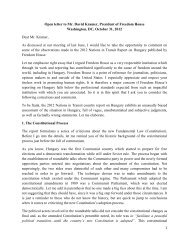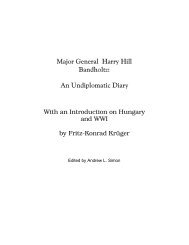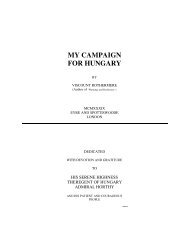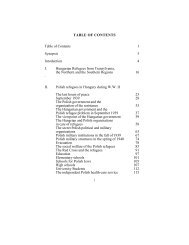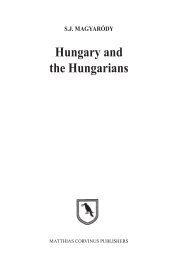The Fate of Western Hungary 1918-1921 - Corvinus Library ...
The Fate of Western Hungary 1918-1921 - Corvinus Library ...
The Fate of Western Hungary 1918-1921 - Corvinus Library ...
You also want an ePaper? Increase the reach of your titles
YUMPU automatically turns print PDFs into web optimized ePapers that Google loves.
for annexation. 222<br />
In the matter <strong>of</strong> the propaganda promoted by the Austrian delegates,<br />
representative Sigray addressed a question in Parliament on August 7, 1920 to<br />
Prime Minister and Foreign Minister Pál Teleki. According to Sigray, the<br />
Viennese delegates “are now trying to win the population to the idea <strong>of</strong> splitting<br />
from <strong>Hungary</strong> and are spreading word that the union <strong>of</strong> the Austrian Republic<br />
to the German Empire is a foregone conclusion and that the German-speaking<br />
region <strong>of</strong> <strong>Western</strong> <strong>Hungary</strong> will not be part <strong>of</strong> an unviable Austria but a revived<br />
and territorially enlarged, again mighty, Germany through Anschluss.” 223 Sigray<br />
finally asked what steps the Hungarian government is taking to counter the<br />
Austrian propaganda?<br />
In his reply, the prime minister stated that “I have no immediate and <strong>of</strong>ficial<br />
knowledge” that <strong>Western</strong> <strong>Hungary</strong> is to be annexed to Germany and not<br />
Austria. With regard to the Austrian agitation, he would order an inquiry and<br />
asked the aid <strong>of</strong> the representative posing the question. “Ins<strong>of</strong>ar as there is<br />
agitation – said Teleki – I must, at the least, bring it up with the Austrian<br />
government because the representatives <strong>of</strong> German Austria are not there with<br />
the goal <strong>of</strong> agitation but are delegated to the Mission for other reason. In any<br />
case, the question itself with which they agitate is perhaps <strong>of</strong> interest not so<br />
much for us as for the Entente, which gave this territory to Austria in the Saint-<br />
Germain peace and over which Austria intends to hold a plebiscite. (…) I will<br />
take steps if necessity demands it.” 224<br />
Count Sigray acknowledged the prime minister’s response and noted that he<br />
would attempt to provide as much information as possible to the Hungarian<br />
government regarding the opinion-influencing activities in Sopron County by<br />
the Austrian delegates. “It is certain that they are taking advantage <strong>of</strong> the<br />
situation and are creating agitation. In fact, we will prove that they are<br />
maintaining an entire <strong>of</strong>fice where they receive all the malcontents and grant<br />
some jobs and positions. In other words, behave as if the territory was already<br />
not under Hungarian sovereignty. (…) <strong>The</strong>y overstep the Austrian government<br />
signed (…) Saint-Germain treaty’s point 88, which precisely forbids Austria’s<br />
union with Germany, [yet] they agitate with it. It is essentially not our problem<br />
(…) it is the Entente’s because it would interest them more that a Germany,<br />
which they certainly do not wish to strengthen, would extend to the line <strong>of</strong> the<br />
Raba [River] through this union.” 225 Sigray again drew attention to the fact that,<br />
in spite <strong>of</strong> the Entente matter, the Hungarian government “should not tolerate”<br />
the Austrian agitation in Sopron.<br />
Although Austria did not possess adequate military forces, it took an ever<br />
222 Träger, Ernő: A soproni népszavazás [<strong>The</strong> Sopron plebiscite]. A szomorúság,<br />
bizakodás és hűség napjairól. In: Sopron. Civitas Fidelissima. Szerk/ed.: Thirring,<br />
Gusztáv, Sopron, 1925, p. 76. (<strong>The</strong> work also appeared in German as Träger, Ernst: Die<br />
Volksabstimmung in Sopron. Dezember <strong>1921</strong>. Ödenburg, pp. 14–16.)<br />
223 Nemzetgyűlési Napló, IV. kötet. Budapest, 1920. 304. old.<br />
224 Ibid.<br />
225 Ibid, pp. 304–305.<br />
94




